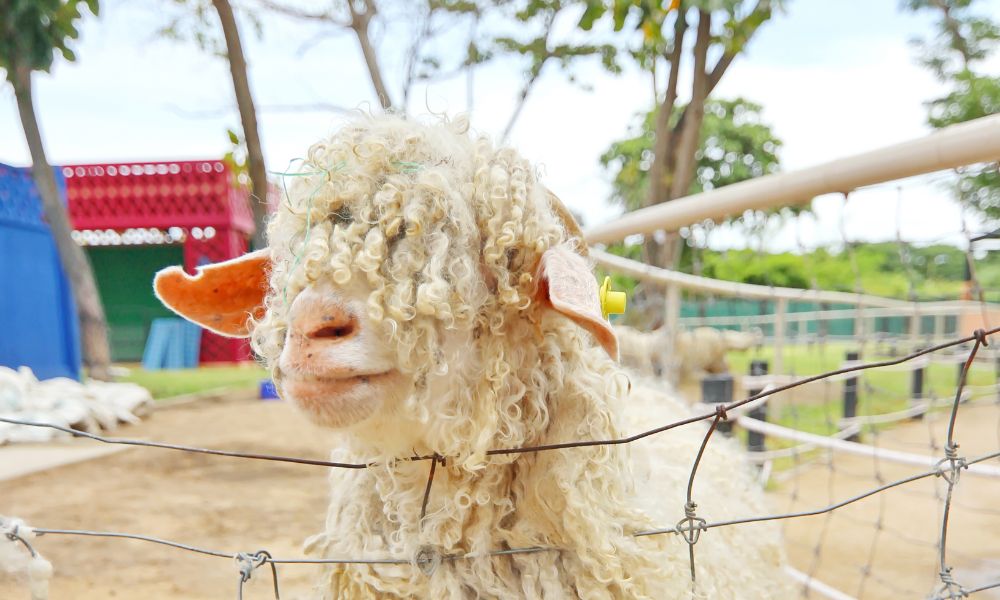In general, Angora goats are not all that much harder to look after than any breed of goat.
They of course need space and cleaning up after them can be a relatively big job.
If you can handle all that, though, it’s just a case of how well prepared you are to protect them from harsh weather conditions.
Let’s find out more.

Is it easy to keep Angora goats?
On the whole, yes, Angora goats are reasonably easy to keep.
Again, though, a large part of this answer is going to depend on where you live and your local climate and conditions.
But let’s first look at what does make Angora goats easy to keep.
Firstly, their temperament is very friendly and they love being around people.
Especially when raised with the proper exposure to people, Angora goats develop highly inquisitive and relaxed personalities which make them great companion goats.
They enjoy attention and physical interactions, and can even form particularly deep bonds with their humans.
As far as their day to day needs, I’ll go into more detail shortly, but the long and short of it is that Angora goats don’t require a great deal more upkeep than any other breed, really.
They are certainly easier to manage than much larger breeds like the Boer goat, and so are comparable to the average sized goat in terms of how easy it is to keep up with their daily needs.
The big challenge you’re going to face with Angora goats, compared with other goats, is their weather hardiness.
Comparatively speaking, Angora goats are not a particularly hardy breed, and they don’t deal very well with inclement weather.
They are going to need good protection in the winter, and somewhere to go and stay warm while it is cold.
Without proper protection from the cold, the goats may wind up ill and ultimately it can lead to serious problems and even death.
If cold weather is the prevailing conditions throughout the year in your local climate, then Angora goats may not be the best choice for you.
How much room do Angora goats need?
Angora goats need a pretty considerable amount of space—although not really more than comparatively sized goats.
The first thing I would say on this question is that, if you have not yet bought any goats, you always need to think of it in terms of a herd.
You cannot have a single goat living on its own—goats are highly social herd animals and need the company of their own species.
Ideally, you would have three to four goats at least.
With that said, each individual goat should have around a quarter acre of land.
So, the smallest plot of land you might reasonably keep a herd of goats on is going to be somewhere between three quarters of an acre and one acre.
Goats are roaming foragers, and Angoras are no different.
They like to explore a large area and, even though Angoras are quite happy simply grazing on grass, they also like to have access to forage too.
The other thing to consider is how much indoor space each goat is going to need.
Angora goats in particular are going to need shelter to sleep in and for the winter time, so this is something you’ve got to keep in mind.
Each goat should have an enclosure of around 16 square feet to sleep in.
What do Angora goats eat?
Angora goats do best with a variety of foods including browse in a pasture, crop residues, and fresh fruits and vegetables from time to time.
Hay will do if there is no pasture available, but a pasture is generally the better choice.
It will keep them entertained in exploring it as well as providing a better balance than just hay would.
Protein and grain supplements are a good idea, too.
If you account for all of this, your goats will have a complete diet that provides all the nutrition they need.
That said, you can always change things up and try something new—they may end up preferring it.
This is certainly easier with a smaller herd.
In terms of food needs, Angora goats are really quite simple animals.
How long do Angora goats live?
Angora goats generally live for eight to ten years.
They can live up to 12 years in exceptional circumstances, but this is somewhat rare.
Goats in general tend to live somewhere between five and ten years, so you should expect your goat to be around for at least a decade, depending on the age it was when you bought it.
They may not be the longest lived, but it’s still a commitment to look after such an animal for this long—so do keep that in mind.
If you’re up to the challenges involved with looking after goats in general, then in all likelihood you will be up to looking after Angora goats.
At the same time, you shouldn’t underestimate the challenges that can be involved in keeping them protected from harsh weather.
If you live in mild conditions, then you shouldn’t have much trouble—but with cold winter snaps, you’re going to have more to be prepared for.
More in Angora
- Are Angora Goats Easy To Look After?
- Are Angora Goats Friendly?
- Are Angora Goats Good For Meat?
- Are Angora Goats Good Milkers?
- Are Angora Goats Hardy?
- Are Angora Goats Profitable?
- Are Angora Goats Rare?
- Do Angora Goats Need To Be Shorn?
- How Long Do Angora Goats Live?
- How Much Does An Angora Goat Cost?
